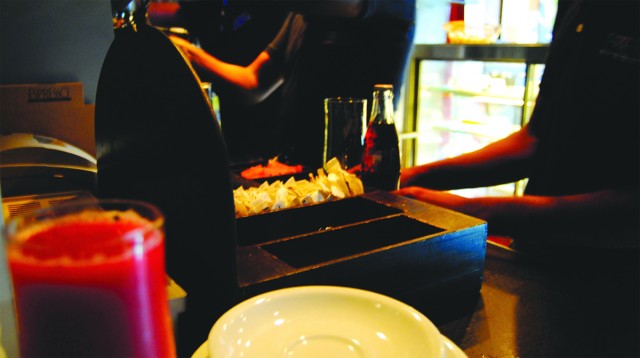
As such, Espresso is one of the few truly home-grown enterprises that is something of a runaway success, notable not just for how well it is doing, but also for the scale and scope of its expansion. It may not be a Bar-B-Q Tonite, which is — frankly — a law unto itself, but for a place that, at the end of the day, sells coffee and snacks, it has managed to survive (and thrive) in an economy that has laid waste to any number of its competitors, even the international ones such as Costa Coffee. Kamil makes no bones about why he sees most franchises as something that aren’t necessary sustainable.
“This isn’t Europe or America,” he says, rolling his eyes. “It’s not even Dubai or India. Pakistan is a unique case: you can’t compare economies, logistics, warehousing etc., and most franchises are import-based. When you operate between pushcarts and DHL — like we do in Pakistan — there’s a huge range of ways in which our supply chain works, and a lot of franchise operators don’t necessarily understand that, not well. If you think about it, in the last couple of years alone, we’ve seen Costa Coffee, Café Barbera, Bread People, Café Coffee Day, all either close or reduce their presence. It’s not a sustainable way of doing business.”
What has helped Espresso succeed, however, is that it manages to bridge several gaps. Food is, as Kamil points out, relative. “It’s a completely subjective experience: everyone has a different take on what ‘good’ food actually is. An espresso bar or a coffee-shop or a bistro all have a number of overlaps, but they also have several variances. You can’t generalise and assume that the market will respond well to the same thing, just in a different venue. You have to look at sub-categories and experiences.”
One of the biggest reasons for the success of Espresso lies in the fact that Kamil and his business partners adopted a very structured, controlled approach towards growth. “People grow too fast,” I’m told. “They make a lot of money initially because every place is popular when it opens, but people don’t always come back. When you grow too fast, you wind up compromising on food quality, on the staff you hire, on the way in which you do business, because you’re overwhelmed. The formula stops making economic sense.”
Although the Espresso management started planning their second coffee-bar within a year of opening, they spent their entire first year focusing on establishing their training methods, their supply chain and implementing a robust logistics system. It hasn’t remained steady though; as Kamil wryly notes, he has had to change what he thinks every single year, depending on what he’s learned. The one thing that has remained consistent though, is the fact that human resources are key to running a restaurant; when you combine these with operational skills and local area knowledge, you’ll have a success story. This can be as basic as spreading the news via word-of-mouth, or as complex as menu engineering, based on cold-storage-unit availability and loss-making item analysis, but what it really takes is an investment in those individuals who are operating your business on a day-to-day basis. “It’s not just about whether onion rings are too expensive to import,” Khan laughs. “You’re basically running a training institute, and you have to make sure that your team is capable of functioning on its own, or that you only have to touch base with them occasionally, not every minute of every day.”
Many people are told that they should kick-start their careers as restaurateurs by offering catering services before expanding into something larger. Kamil, however, has a different view. “Catering and running a restaurant are very different businesses. Good cooks don’t always have the operational skills to run an actual restaurant. The unfortunate thing about the hospitality industry in Pakistan and most third world countries is that the people working here don’t have any higher education, so you’re dealing with people, some of whom can barely read. That can be okay in a small kitchen where you have a lot of presence, but if you’re trying to run a full-service restaurant, it’s just not feasible to split your attention between both the front and back of house. Nothing will get done.”
Unlike some of the fine-dining options open in the country, Espresso doesn’t require Kamil to be present all the time. While the initial investment in time and energy was required, his time now is spent on looking at how things are running; the kind of feedback that Espresso is getting on its Facebook page; getting a newsletter out on a regular basis. “You don’t have to be there all the time; if you do, you’ll never be able to open more than one outlet, because you’ll have to be there to run everything yourself,” Khan says, right before asking me to check his newsletter for typos. Fortunately, there aren’t any. And with the amount of attention Khan pays to Espresso, that’s not a surprise.
Published in the Express Tribune, May 30th, 2010.






1732356840-0/Copy-of-Untitled-(1)1732356840-0-270x192.webp)



1732355030-0/BeFunk_§_]__-(41)1732355030-0.jpg)






COMMENTS (2)
Comments are moderated and generally will be posted if they are on-topic and not abusive.
For more information, please see our Comments FAQ